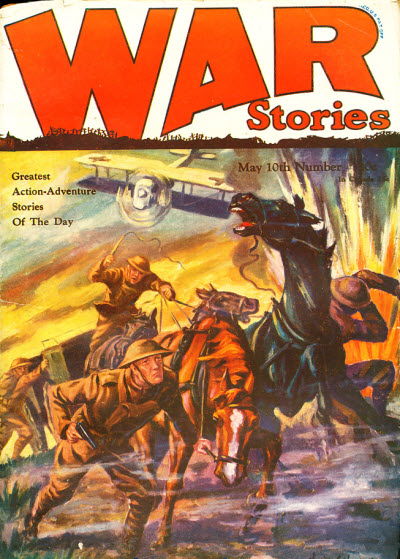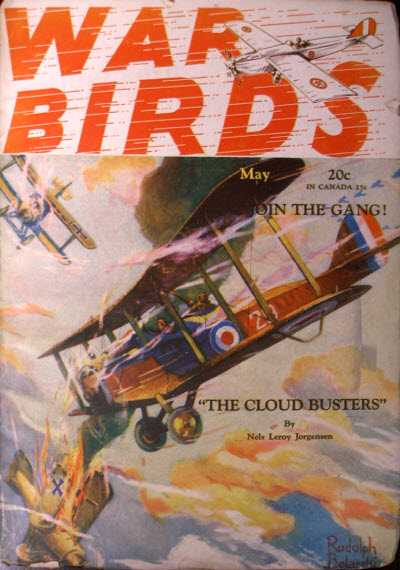“The Invisible Ace” by Ralph Oppenheim
“LET’S GO!” Once more, The Three Mosquitoes familiar battle cry rings out over the western front and the three khaki Spads take to the air, each sporting the famous Mosquito insignia. In the cockpits sat three warriors who were known wherever men flew as the greatest and most hell raising trio of aces ever to blaze their way through overwhelming odds—always in front was Kirby, their impetuous young leader. Flanking him on either side were the mild-eyed and corpulent Shorty Carn, and lanky Travis, the eldest and wisest Mosquito.
We’re back with  the second of three tales of Ralph Oppenheim’s Three Mosquitoes we’re featuring this March for Mosquito Month! This week, our intrepid trio hunt for the Invisible Ace!
the second of three tales of Ralph Oppenheim’s Three Mosquitoes we’re featuring this March for Mosquito Month! This week, our intrepid trio hunt for the Invisible Ace!
Seven Spads had fallen beneath the twin Spandau guns of the Invisible Ace— so called because no one had really seen this German flyer. Only a flash of wings in the sunlight, a black-cross insignia, a streaking gray shape—that was all they had seen of him. So swift would be the execution—like the trick of a master magician where the “hand is quicker than the eye”—that the other pilots of the flight could never spring into action until it was too late. They would hear the burst of machine-gun fire, and when they turned they would see the victim hurtling below them. But the Invisible Ace would already be up in the sun again, safe from prying eyes. So the Three Mosquitoes are tasked with bringing “The Invisible Ace” to light and ending his reign of terror! From the May 10th, 1928 issue of War Stories, it’s Ralph Oppenheim’s “The Invisible Ace!”
The Invisible Ace was raising hell with the squadron, and—But it’s another great flying yarn about the famous “Three Mosquitoes,” so why spill any more words about it?
- Download “The Invisible Ace” (May 10, 1928, War Stories)
And check back next Friday when the inseparable trio will be back with another exciting adventure!





 tale of the Hell-Cat Squadron from the prolific pen of Alexis Rossoff. The adventures of the Hell-Cat Brood ran in War Birds, War Stories and Flying Aces. The Seventy-Seventh Squadron had a reputation of being short on technique and long on defying every regulation in the book. The squadron was the cause of many gray hairs on the pates of the star-spangled ones back in G.H.Q. They flew their merry way like nobody’s business, and played hell with any Jerry who tried to dispute their intention of going places. This bunch of cloud-hopping war birds were known from one end of the Western front to the other as the “Hell-cats”—and sometimes the “Unholy Dozen!”
tale of the Hell-Cat Squadron from the prolific pen of Alexis Rossoff. The adventures of the Hell-Cat Brood ran in War Birds, War Stories and Flying Aces. The Seventy-Seventh Squadron had a reputation of being short on technique and long on defying every regulation in the book. The squadron was the cause of many gray hairs on the pates of the star-spangled ones back in G.H.Q. They flew their merry way like nobody’s business, and played hell with any Jerry who tried to dispute their intention of going places. This bunch of cloud-hopping war birds were known from one end of the Western front to the other as the “Hell-cats”—and sometimes the “Unholy Dozen!”